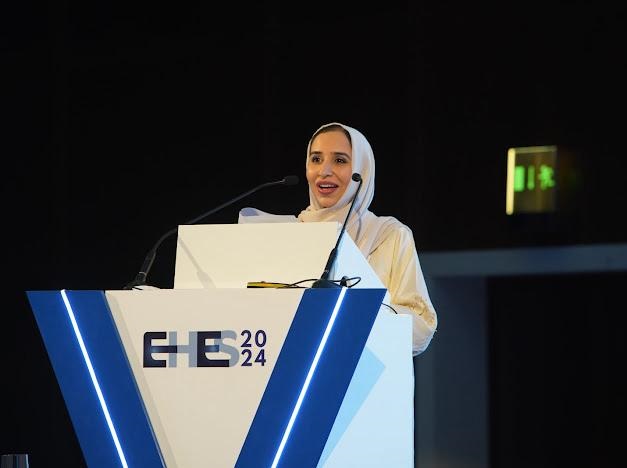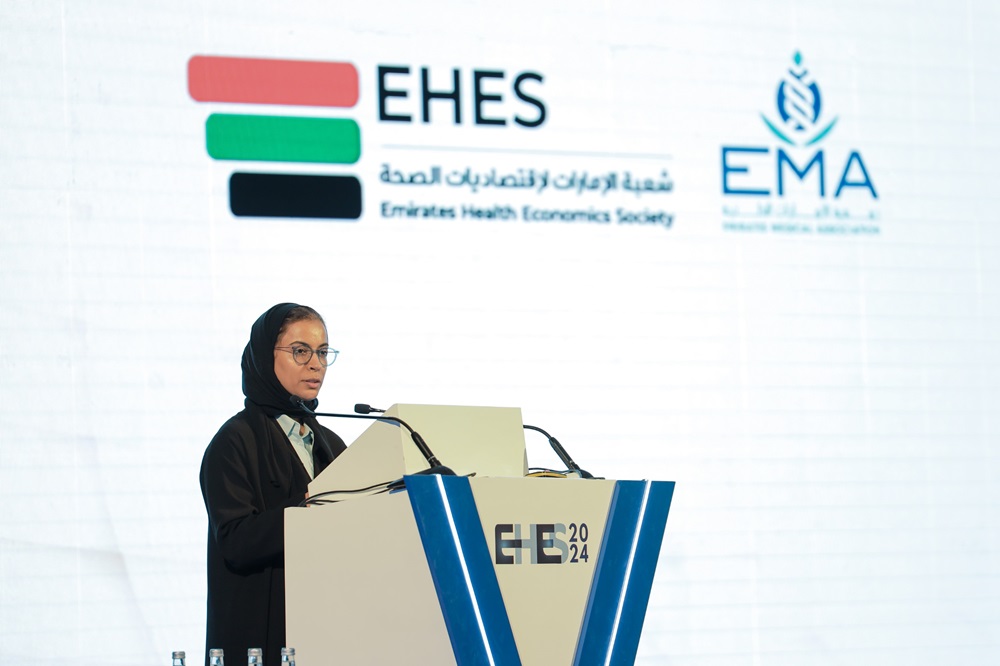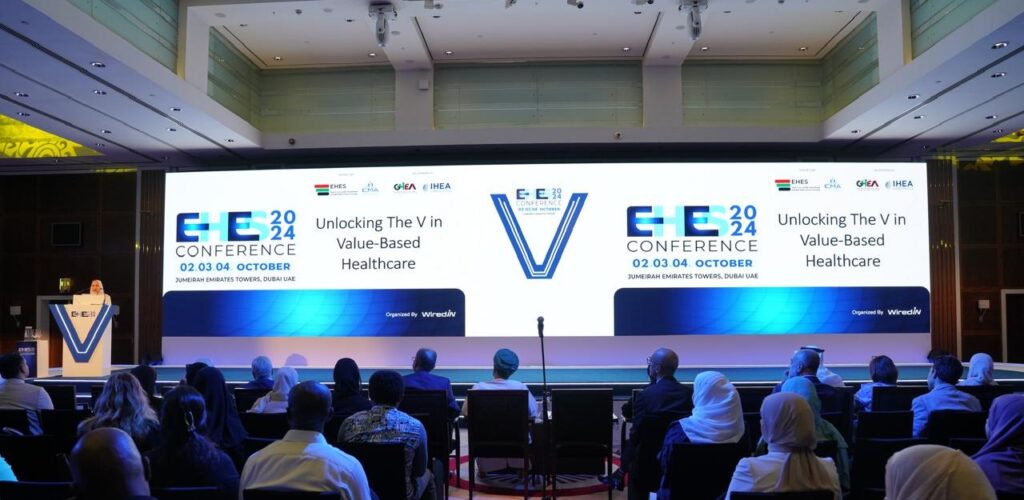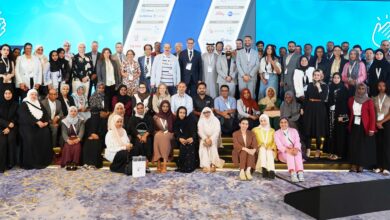: Exploring the Future of Healthcare Financing and Global Innovations
- The conference highlighted the importance of advanced strategies and innovative solutions for ensuring sustainable healthcare financing in the Gulf countries.

Dubai, United Arab Emirates – 6 October 2024: The 4th Emirates Health Economics Society (EHES) Annual Conference 2024 recently concluded its proceedings at the Jumeirah Emirates Towers Hotel in Dubai, with the participation of elite global experts from various countries. The conference, which took place from 2-4 October, aimed to discuss global and regional challenges in health economics, with a focus on sustainable healthcare financing strategies and the development of value-based healthcare systems.

Dr. Fatima Al Kaabi, Director General of Emirates Drug Establishment (EDE) affirmed that the UAE has achieved leadership in health economics both regionally and globally, thanks to the visionary leadership’s support for developing a sustainable and innovative healthcare sector.

This is reflected in the regular issuance of the National Health Account, which helps systematically monitor and analyze progress in health expenditure. It also allows for improved planning and the establishment of evidence-based policies for sustainable health financing, resource allocation, and future investments, contributing to the governance and competitiveness of the healthcare system, making it more responsive to societal needs while enhancing transparency and accountability.
Al Kaabi added: “Emirates Drug Establishment places significant importance on applying health economics principles in decision-making and policy formulation. The interrelated dynamics of finance, economics, policies, regulations, and healthcare are central to our efforts toward building a sustainable and efficient healthcare system. The Corporation is also working on developing innovative financing models for new drugs and treatments, ensuring equitable access while maintaining the sustainability of the healthcare system. Additionally, we support periodic economic studies to assess the impact of pricing policies on the pharmaceutical market and the broader economy, utilizing artificial intelligence tools to manage health data.”
Dr. Sarah Al Dalal, President of the Emirates Health Economics Society, explained that the conference serves as a strategic platform that brings together top global experts to discuss current and future challenges in the healthcare sector and explore innovative initiatives to develop advanced healthcare systems. The sessions focused on value-based healthcare systems, with the participation of health ministries from Gulf countries and experts from the United States, Canada, Germany, and France, along with specialists from Arab countries such as Egypt and Algeria.
Dr. Al Dalal noted that the conference presented pioneering studies aimed at improving the efficiency of health budget utilization and highlighted the growing role of artificial intelligence in enhancing the quality of healthcare. It also shed light on the role of the private sector in reducing health disparities and offering innovative solutions for disease prevention and addressing health challenges like cancer and chronic diseases, contributing to improved healthcare system outcomes.
For his part, Dr. Mohamed Farghaly, Professor of Medicine, Consultant in Diabetes, and Founder of the Center for Value, emphasized the importance of studying healthcare expenditure fundamentals to ensure an effective balance between healthcare quality and associated costs. He noted that this balance is essential for enhancing the efficiency of healthcare systems, allowing high-quality healthcare services to be provided to UAE citizens and residents.
Day 1:
The first day of the conference included a keynote session titled “Global Trends and Challenges in Healthcare Financing,” presented by Dr. Ajay Tandon is Lead Economist with the World Bank’s Global Practice on Health, Nutrition, and Population. This was followed by multiple contributions from prominent specialists. The sessions on the first day included discussions on assessing health outcomes for economic evaluation, presented by Professor Paul Kind, Emeritus Professor in the Department of Applied Health Research, University College London, UK, as well as a session on catastrophic health spending with Professor John Ataguba. The conference also addressed the importance of involving patients in health technology assessments, and the day concluded with a discussion by Dr. Mohamed Farghaly on the shifts toward value-based healthcare in the UAE.
The first day also featured a panel discussion on the new perspective on medical innovations, attended by Mr. Marwan Janahi, Executive Director of Dubai Science Park, Dr. Mohamed Al Bitar, Advisor for the Research, Innovation and Strategy at the Department of Health Abu Dhabi (DoH), and Dr. Thikra Hassan, Director of the Pharmaceuticals and Medical Products Division, Ministry of Health – Abu Dhabi.
Day 2:
The second day continued discussions on environmental health challenges and the impact of climate change on health systems. Professor Andrew is a Professor of Health Economics at the London School of Hygiene & Tropical Medicine, UK, delivered a session on environmental considerations in health evaluations, while Professor Abdulla Shehab, Consultant in Interventional Cardiology, Vice President of the Emirates Cardiac Society and the Gulf Heart Association, and Professor of Medicine at UAE University, led sessions on managing obesity and heart diseases, pointing to sustainable solutions that can alleviate the financial burden of chronic diseases.
Throughout the day, new and innovative insights were presented on treatments for diseases such as migraines, breast cancer, and atopic dermatitis, enhancing the optimal use of health resources. The sessions also highlighted the importance of mental health, with psychological therapy becoming a strategic necessity rather than a luxury.
Day 3:
On the final day, the sessions focused on reviewing health data management and governance mechanisms, with a session by Dr. Steve MacFeely, Chief Statistician at the Organization for Economic Cooperation and Development (OECD). Discussions also explored the future of healthcare financing using modern technology and artificial intelligence, and their impact on healthcare delivery in the future. The sessions featured the latest developments in the health sector across the Gulf, with participation from top experts from Saudi Arabia, Kuwait, Oman, Bahrain, and Qatar.
The third day also included sessions on healthcare labor market dynamics and shifts in health policies in the region, with a special focus on Saudi and Kuwaiti experiences in this field.
Future Direction:
The conference presented numerous studies and research on cost-effectiveness analysis and budget impact analysis, alongside an in-depth study conducted by the Emirates Health Economics Society to determine the minimum cost-effectiveness threshold. This significantly contributes to improving the efficiency of healthcare services while preserving resources, ensuring the sustainability of healthcare financing in light of global innovations and enhancing the overall effectiveness of the healthcare system.
The Emirates Health Economics Society, through the conference, aims to provide a platform for sharing the latest developments in scientific research and building bridges of collaboration between specialists in this field across the Gulf countries. It also addresses common challenges and works to confront them through various workshops aimed at developing optimal solutions.
Thanks to these initiatives, the UAE is becoming a model for the region, committed to improving the quality of life for its citizens and residents by offering innovative and sustainable healthcare solutions that meet the growing needs of a rapidly changing world.





